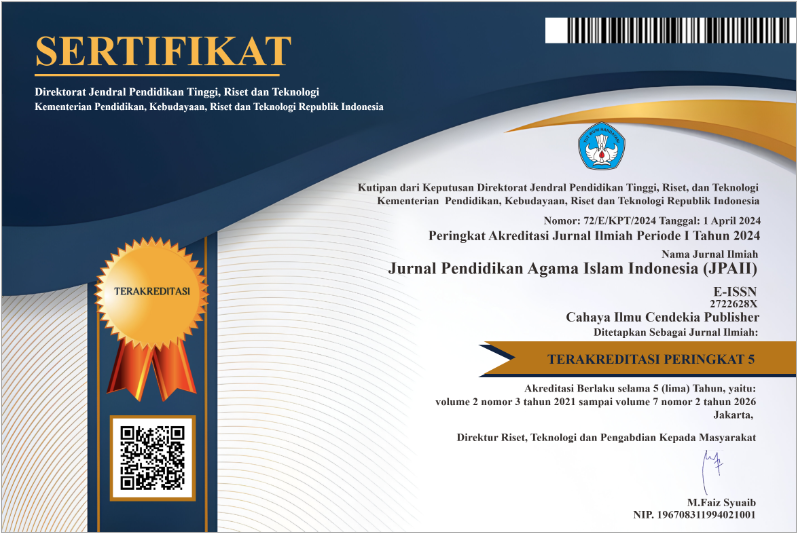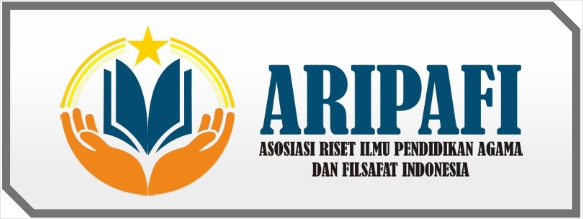The Tradition of Rejectiveness: The Character of Responsibility in Islamic Education Values
Abstract
Purpose of the study: The aim of this research is to find out the values of Islamic education in the 1 Muharram Tradition which strengthen the character of community responsibility.
Methodology: This research uses a qualitative approach with the people of kepahiang. The data collection techniques are observation, interview and documentation methods. The data analysis technique is triangulation, which involves comparing and cross-checking data from different sources and perspectives.
Main Findings: The values of Islamic education in 1 Muharram can strengthen faith and piety and obedience to Allah SWT and always be grateful for the blessings that Allah has given. Local wisdom values can be found in various aspects of culture, such as language, art, literature, religion and customs . Local wisdom values can be used as values in Islamic education in any country, by integrating them with Islamic teachings and values, as long as they do not conflict with the Qur'an and Sunnah. In this way, Islamic education can benefit from the richness and diversity of local culture, and respect and preserve it. Islamic education can also increase the relevance and application of Islamic values in local contexts, as well as foster harmony and cooperation between Muslims and other communities and cultures. Local wisdom values can be used as values in Islamic education in any country, using various methods and strategies, such as curriculum development, teaching and learning activities, extracurricular programs, and community service.
Novelty/Originality of this study: The novelty of this research lies in exploring and evaluating the potential benefits and dangers of a culture of rejection towards the development and enhancement of Islamic values and the character of responsibility in Islamic education, using a critical and comparative approach.
References
N. Nurhadi, “Achieving Lives Through The Secret Of Prayer,” Al-Mutharahah: Jurnal Penelitian dan Kajian Sosial Keagamaan, vol. 18, no. 1, pp. 13-22, 2021, doi: 10.46781/al-mutharahah.v18i1.159.
A. Nurhuda, I. H. Ansori, and T. E. S. B. E. Ab, “The Urgency Of Prayer In Life Based On The Al-Qur'an Perspective,” LISAN AL-HAL: Jurnal Pengembangan Pemikiran dan Kebudayaan, vol. 17, no. 1, pp. 52-61, 2023, doi: 10.35316/lisanalhal.v17i1.52-61.
M. A. Al Haq, N. A. Wahab, A. Abd Ghani, and N. H. Ahmad, “Islamic prayer, spirituality and productivity: an exploratory conceptual analysis,” Al-Iqtishad: Jurnal Ilmu Ekonomi Syariah, vol. 8, no. 2, pp. 271-286, 2016, doi: 10.15408/aiq.v8i2.3160.
R. Embong, S. Salleh, W. M. W. Yusof, N. Noruddin, M. Z. B. Ismail, M. N. M. Noor, and N. A. Abdullah, “Islamic belief and practices: An integrative coping approach to life problems,” International Journal of Academic Research in Progressive Education and Development, vol. 6, no. 3, pp. 97-109, 2017, doi: 10.6007/IJARPED/v6-i3/3176.
Maiwada, D. A. (2017). Spirituality in Man as a Natural Dispensation: Its Consequential and Therapeutic Effects. Studies in Applications of Psychology and Counseling in Asian Context, 57, 2017.
Z. A. Majid, “The Concept of Prayer for A Muslim to Maintain Mental Health (In the Perspective of Islamic Psychology),” Journal of Survey in Fisheries Sciences, vol. 10, no. 1, pp. 178-188, 2023, doi: 10.17762/sfs.v10i1.428.
S. M. Alam, “Jannah-is guaranteed by Allah if you embrace Shahada in your Heart, be kind to your Parents, help the Needy and follow the other Pillars of Islam,” Journal of Research and Opinion, vol. 8, no. 2, pp. 2853-2894, 2021, doi: 10.15520/jro.v8i2.90.
T. Mohseni and K. A. Bighash, “Psychological Effects of Charitable Activities on the Worldly Mental Health and Eternal Happiness of the Hereafter from the Perspective of the Qur'an and Hadith,” International Journal of Multicultural and Multireligious Understanding, vol. 7, no. 6, pp. 180-196, doi: 10.18415/ijmmu.v7i6.1625.
U. J. Muhammad, “Featuring Knowledge as the Means to the Essence of Creation: An Islamic Exposition,” Al-Misbah (Jurnal Islamic Studies), vol. 9, no. 2, pp. 115-127, 2021, doi: 10.26555/almisbah.v9i2.4926.
M. G. Ma'arif, R. Pratama, and M. S. Hassan, “The Beauty of Patience and Gratitude Based on the Hadith narrated by Imam Muslim from Abu Suhaib Bin Sinan,” Socio-Economic and Humanistic Aspects for Township and Industry, vol. 1, no. 1, pp. 65-70, 2023, doi: 10.59535/sehati.v1i1.117.
M. Bilal, N. ul Haq, S. M. H. Agha, S. A. Bukhari, H. Bano, and A. Rehman, “In The Light Of Holy Books, The Concept Of Rewards For Worship In Inspired Religions.(Scientific And Research Review),” Journal of Positive School Psychology, 2012-2030, 2023,
R. Embong, S. Salleh, W. M. W. Yusof, N. Noruddin, M. Z. B. Ismail, M. N. M. Noor, and N. A. Abdullah, “Islamic belief and practices: An integrative coping approach to life problems,” International Journal of Academic Research in Progressive Education and Development, vol. 6, no. 3, pp. 97-109, 2017,
B. Bensaid, F. Grine, M. R. M. Nor, and M. Y. Z. MohdYusoff, “Ethico-spiritual dimensions of charity: An Islamic perspective,” Middle-East Journal of Scientific Research, vol. 13, no. 13, 2013.
T. Basharat, “The characteristic features of worship as propounded by Islam,” Al-Adwa, vol. 24, pp. 27-41, 2009.
M. R. Amin, and M. G. Mohiuddin, “Motivating people in organizations: The Islamic way,” International Journal of Islamic Management and Business, vol. 2, no. 2, pp. 33-47, 2016, doi: 10.33258/birci.v5i1.4142.
N. J. Turner, I. J. Davidson-Hunt, and M. O'flaherty, “Living on the edge: ecological and cultural edges as sources of diversity for social—ecological resilience,” Human Ecology, vol. 31, pp. 439-461, 2003, doi: 10.1023/A:1025023906459.
T. A. Crane, “Of models and meanings: Cultural resilience in social–ecological,” Ecology and Society, vol. 15, no. 4, 2010.
E. Gómez-Baggethun, V. Reyes-García, P. Olsson, and C. Montes, “Traditional ecological knowledge and community resilience to environmental extremes: A case study in Doñana, SW Spain,” Global Environmental Change, vol. 22, no. 3, pp. 640-650, 2012.
J. Xu, E. T. Ma, D. Tashi, Y. Fu, Z. Lu, and D. Melick, “Integrating sacred knowledge for conservation: cultures and landscapes in southwest China,” Ecology and Society, vol. 10, no. 2, 2005.
F. Motti-Stefanidi, A. S. Masten, “Immigrant youth resilience: Integrating developmental and cultural perspectives,” Contextualizing immigrant and refugee resilience: Cultural and acculturation perspectives, pp. 11-31, 2020, doi: 10.1007/978-3-030-42303-2_2.
M. A. Nan, Y. A. N. G. Lun, M. I. N. Qingwen, B. Keyu, and L. Wenhua, “The significance of traditional culture for agricultural biodiversity—Experiences from GIAHS,” Journal of Resources and Ecology, vol. 12, no. 4, pp. 453-461, 2021, doi: 10.5814/j.issn.1674-764x.2021.04.003.
Z. A. Mani, and K. Goniewicz, “Adapting disaster preparedness strategies to changing climate patterns in Saudi Arabia: A rapid review,” Sustainability, vol. 15, no. 19, pp. 14279, 2023, doi: 10.3390/su151914279.
P. Pandey, and M. M. Pandey, Research methodology tools and techniques. Bridge Center, 2021.
J. K. Nayak, and P. Singh, Fundamentals of research methodology problems and prospects. SSDN Publishers & Distributors, 2021.
U. K. B. Dubey, and D. P. Kothari, Research methodology: Techniques and trends. CRC Press.
M. Mustamin, S. Saleh, A. R. Razak, I. Muchtar, and S. Suriyati, “Islamic Educational Values in Local Wisdom Traditional Tradition of Mappogau Sihanua Karampuang Sinjai District,” IJORER: International Journal of Recent Educational Research, vol. 4, no. 2, pp. 188-202, 2023, doi: .
W. Darmalaksana, T. Ratnasih, and S. Nur, “The Relationship between Islam and Local Wisdom in the Kampung Naga Tradition: Living Sunnah Research,” Diroyah: Jurnal Studi Ilmu Hadis, vol. 6, no. 2, pp. 115-127, 2022, doi: 10.15575/diroyah.v6i2.15316.
A. Kasdi, U. Farida, and C. Mahfud, “Islamic Studies and Local Wisdom at PTKIN in Central Java: Opportunities, Challenges, and Prospects of Pioneering Religious Moderation in Indonesia,” Hikmatuna, vol. 6, no. 1, pp. 51-62, 2020, doi: 10.28918/hikmatuna.v6i1.2618.
L. R. P. Lestari, S. Sopiah, and H. H. Adinugraha, “Integration of islamic education values towards the “yatiman” tradition in the month of suro in pekalongan,” Zawiyah: Jurnal Pemikiran Islam, vol. 7, no. 1, pp. 1-25, 2021.
S. S. Rangkuti, S. Sirait, and M. Soehadha, “Accommodation of Islamic Education Responding to Local Culture,” Al-Tahrir: Jurnal Pemikiran Islam, vol. 21, no. 1, pp. 135-157, 2021, doi: 10.21154/altahrir.v21i1.2837.
A. Kosasih, A. S. Rizal, and A. Asyafah, “Values’ Education Model for Islamic Education Institutions in Indonesia: A Study of Al-Basyariyah Modern Islamic School,” Multicultural education, vol. 6, no. 1, pp. 88-104, 2020, doi: 10.5281/zenodo.3827731.
T. Saumantri, “The Dialectic of Islam Nusantara and Its Contribution To The Development of Religious Moderation In Indonesia,” Fokus: Jurnal Kajian Keislaman Dan Kemasyarakatan, vol. 7, no. 1, pp. 57-67, 2022.
A. M. Arif, N. Nurdin, and E. Elya, “Character Education Management at Islamic Grassroot Education: The Integration of Local Social and Wisdom Values,” Al-Tanzim: Jurnal Manajemen Pendidikan Islam, vol. 7, no. 2, pp. 435-450, 2023, doi: DOI: 10.33650/al-tanzim.v7i2.5468.
T. Murwaningsih, S. S. Fadhilah, and A. R. Sholeh, “The Implementation of Characters’ Values Through Local Wisdom of Sadranan in Elementary Schools,” International Journal of Multicultural and Multireligious Understanding, vol. 7, no. 1, pp. 450-458, 2020, doi: 10.18415/ijmmu.v7i1.1315.
D. Erawati, and R. Rahmayanti, “Development of local wisdom-based islamic education learning material for secondary school students: A design-based research,” Jurnal Iqra': Kajian Ilmu Pendidikan, vol. 6, no. 2, pp. 148-165, 2021, doi: 10.25217/ji.v6i2.1601.
A. Abubakar, D. Aswita, I. Israwati, J. Ferdianto, J. Jailani, A. Anwar, and H. Hayati, “The Implementation of Local Values in Aceh Education Curriculum,” Jurnal Ilmiah Peuradeun, vol. 10, no. 1, pp. 165-182, 2022, doi: 10.26811/peuradeun.v10i1.660.
E. Elan, and E. Solihati, “Potential transformation of baduy local wisdom values in civics education learning in elementary school,” Premiere Educandum: Jurnal Pendidikan Dasar Dan Pembelajaran, vol. 12, no. 1, pp. 88, 2022, doi: 10.25273/pe.v12i1.12492.
A. Tohri, A. Rasyad, M. Sururuddin, and L. M. Istiqlal, “The Urgency of Sasak Local Wisdom-Based Character Education for Elementary School in East Lombok, Indonesia,” International Journal of Evaluation and Research in Education, vol. 11, no. 1, pp. 333-344, 2022, doi: 10.11591/ijere.v11i1.21869.
S. Sukirno, J. Juliati, and T. M. Sahudra, “The Implementation of Character Education as an Effort to Realise the Profile of Pancasila Students Based on Local Wisdom,” AL-ISHLAH: Jurnal Pendidikan, vol. 15, no. 1, pp. 1127-1135, 2023, doi: 10.35445/alishlah.v15i1.2471.
Copyright (c) 2022 Erik Fernando, Mohammad Baihaqi Bin Md Yusnan

This work is licensed under a Creative Commons Attribution-NonCommercial 4.0 International License.
Authors who publish with this journal agree to the following terms:
- Authors retain copyright and acknowledge that the Jurnal Pendidikan Agama Islam Indonesia (JPAII) is the first publisher licensed under a Creative Commons Attribution 4.0 International License.
- Authors are able to enter into separate, additional contractual arrangements for the non-exclusive distribution of the journal's published version of the work (e.g., post it to an institutional repository or publish it in a book), with an acknowledgment of its initial publication in this journal.
- Authors are permitted and encouraged to post their work online (e.g., in institutional repositories or on their website) prior to and during the submission process, as it can lead to productive exchanges and earlier and greater citation of published work.






.png)
.png)





















